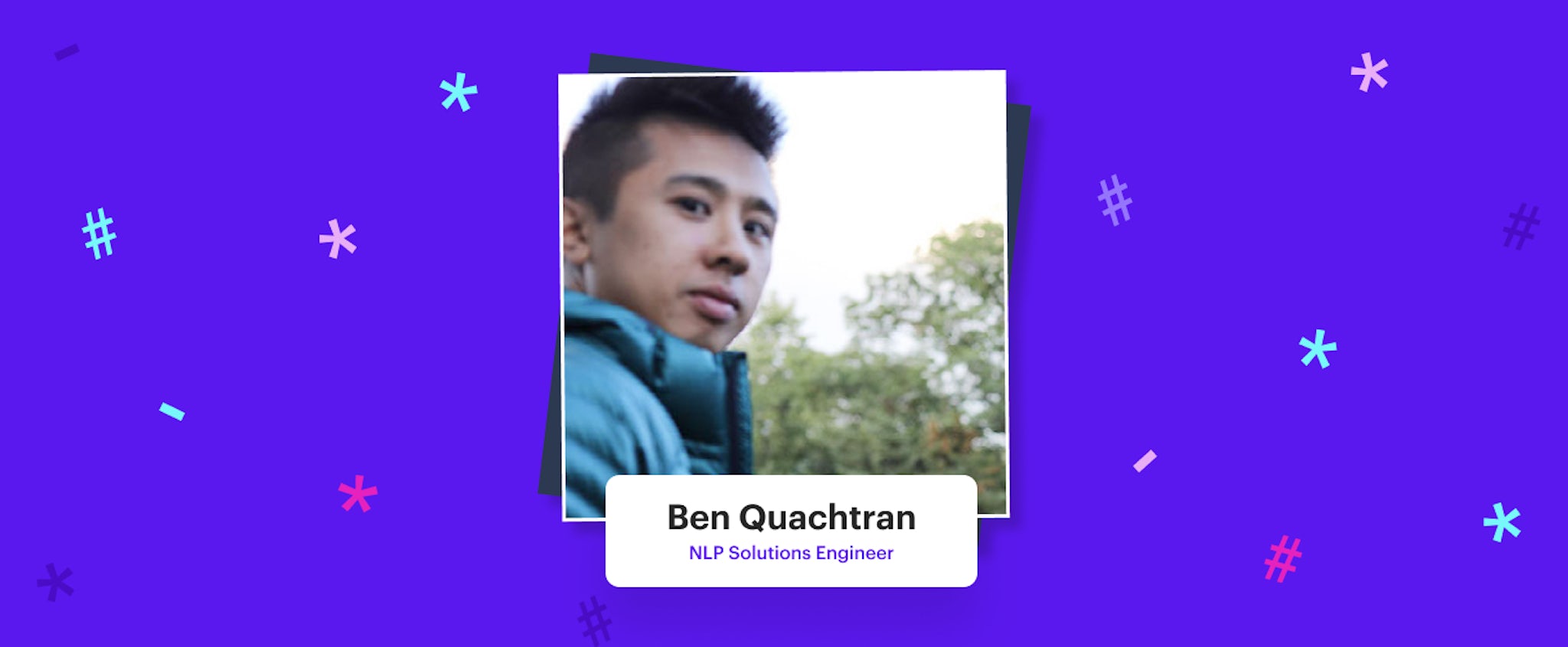October 22nd, 2021
The Humans Behind the Bots: Ben Quachtran
Rasa
At Rasa, our team is building the standard infrastructure for conversational AI. Behind the scenes, the people of Rasa come together from diverse backgrounds to solve today’s most interesting challenges in NLP and dialogue management. We’re pulling back the curtain to highlight a few of the humans behind the bots.
1. Hi, Ben. Tell us about yourself! What was your path to joining Rasa?
My interest in machine learning started while as an undergraduate at university and culminated in a senior design project where I created a small neural network library for image classification that ran on an embedded system. Post-graduation, I started as a software engineer at Disney, initially building NLU models for information retrieval on unstructured data before transitioning to creating conversational AI assistants. When first hearing about Rasa Open Source, I was impressed by the framework's design and flexibility compared to other conversational AI platforms on the market as well as the company's no-nonsense approach to machine learning. I joined the Rasa team in May 2020 as a solutions engineer and have been working here since.
2. Take us through a typical day as a Solutions Engineer. What types of projects do you work on?
As a member of the Customer Success team, my typical day-to-day involves helping customers with the technical aspects of building, deploying, and maintaining their Rasa assistants. I'm sure you can imagine that this varies significantly per customer depending on use case and current stage of development, but it usually involves a combination of running workshops, reviewing architecture designs, debugging deployment issues, and building reference implementations.
3. Which areas of your work are you most passionate about?
I enjoy running workshops for customers who are new to Rasa and getting them up to speed on all the capabilities that the Open Source framework provides them. Many are coming from using competitor platforms where developers and data scientists don't have insight into how the underlying systems work and, for them, the switch to Rasa is a breath of fresh air in the framework's transparency and openness.
4. What's an important problem you're solving at Rasa?
A primary responsibility of the Customer Success team is to ensure that Rasa customers are successful in deploying their conversation AI assistants to production. As you might expect, teams can run into any number of unforeseen problems during initial development and we're here to get them unblocked.
5. How would you describe Rasa in three words?
Transparent, Collaborative, Empowering.
6. How do you collaborate with other teams at Rasa?
The Customer Success team is fairly cross-functional in nature and we spend time working with the Sales team on customer-related planning and the Engineering team on resolving technical issues. Rasa being a remote-first company with team members distributed globally, this mostly translates to Zoom calls and async communication via Slack.
7. What does a culture of diversity mean for you at Rasa?
Diversity for me means a culture where differences are embraced and used as a platform to discuss and learn. At Rasa, we come from an array of backgrounds and inclusion is something that's very much embraced at a company-wide level through frequent discussions planned by our Ops team.
8. How has working at Rasa helped your professional development?
As a fast-growing startup, Rasa empowers employees to take ownership of technical decisions and provides us the flexibility to learn from past mistakes. Colleagues are respectful and helpful whenever questions come up, contributing to the inclusive and diverse environment that really makes Rasa a great place to work. This has helped tremendously with learning new skills and being able to practically apply them as a means for professional development. We also get education days and a personal development budget, which I've used to gain a deeper understanding of Kubernetes-based deployments.
9. What's the most interesting thing you've learned lately?
Weak supervision as an approach for reducing human effort in manually labeling training data: http://ai.stanford.edu/blog/weak-supervision/
10. What's the best career advice you've received?
Let your work speak for itself.
Thanks Ben!
Want to team up with Rasa? We're hiring! Find open positions as Solutions Engineer and other roles on our Jobs Board.
